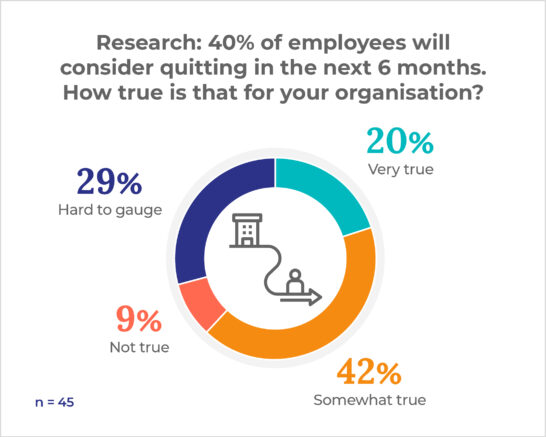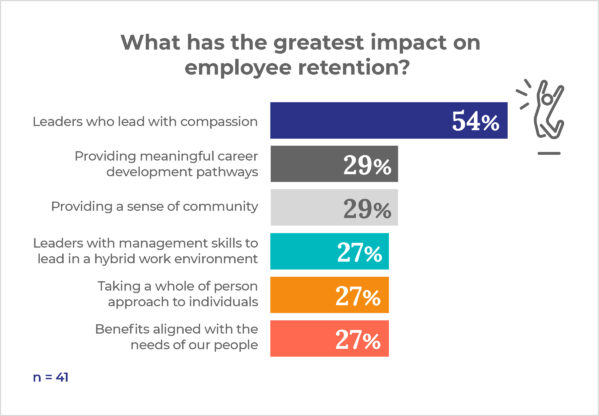Busting Three Misconceptions about the Great Resignation
Busting Three Misconceptions about the Great Resignation
In this month’s blog, we continue on the theme of the Great Resignation – a global trend that suggests that two in five people are considering quitting their job. If true, employers in this part of the world should be bracing themselves for a mass exodus of their people. But how accurate are the projections? To get behind the numbers, SMG hosted a webinar with three experts on talent and retention: Bernadette Bruton, Executive General Manager, Culture, Leadership and Learning at NAB, Pierre de Villiers, General Manager, People Centre of Expertise, Allianz and Lynn Rasmussen, SMG Career Transition Specialist, and the former Head of Executive Talent Development at Westpac.
In this summary article of a wide-ranging discussion, we focus on three misconceptions about the Great Resignation highlighted by the panel discussion – and what to do about them to retain your best people:
Misconception #1: The Great Resignation is Happening Across the Board
The projected stampede of top talent out of the door may be a little premature. In our webinar poll, we did a sense-check on the data that 40% of employees are considering quitting in the next six months.

The overwhelming majority of respondents – 80% — said the data was only somewhat true, not true, or hard to gauge.
NAB’s Bernadette Bruton pointed to an interesting juxtaposition at the Big Four bank: “Over the past year we have seen motivation and commitment levels go up. [However], we definitely have pockets where it’s much harder to hold on to talent – digital talent in particular. With our borders closed and [the demands of] FinTech rising at a rate of knots, that is one of the big talent concerns that we have.”
Pierre de Villers said that the explosion in FinTech means that companies like Allianz are fighting for the same talent as heavyweights like Google: “Everyone’s fishing in the same [shallow] pool of digital talent. There certainly are some good opportunities out there that are that are genuinely career-defining for some people.”
Misconception #2: A Pay Increase is the Biggest Draw Card to Keep Talent
Organisations are responding to the challenge of losing key talent with substantial pay increases. But evidence from a number of studies shows that a leader’s ability to understand and respond to the individual needs of their colleagues can have an even bigger impact in helping them to stay.
“Big problems don’t always need big solutions” according to Pierre de Villiers. To illustrate the point, he pointed to a study on motivation carried out a few years ago by two Nobel prize-winning economists.
Abhijit Banerjee and Esther Duflo discovered that they could increase immunisation rates in rural India when the population had access to mobile clinics with reliable staffing. But the effect tripled in villages where they also received a kilo of lentils for each vaccination.
Pierre de Villiers sees the vaccination story as a powerful metaphor for the challenge of looming attrition: “Just spend some time with people, build a personal connection, demonstrate trust. I think there are many leaders out there who might say, ‘But what else can I do? Surely that’s not enough’. But actually, that is what people are looking for.”
Pierre’s view was borne out in our webinar poll which asked which of a range of factors for employee retention had the greatest impact:

The poll also helped zero-in on a third misconception:
Misconception #3. Leading with Empathy is a ‘Soft’ Skill
“The ability to have empathy and compassion helps you make sense of what’s required of you or your team,” according to Bernadette Bruton. “It’s absolutely important to be able to pick the right language, say something that is meaningful to your team [that is] not removed from their reality. So actually, empathy and compassion is the hard part of being a leader, not the easy part.”
Can empathy be taught? The webinar panel members held the view that yes, it can be, by holding up the mirror of self-awareness through, for example, working with an external coach.
However, Lynn Rasmussen added one important caveat, “I’d be pretty nervous if I was doing an assessment of a very senior leader, prior to hiring or promoting them, and there were some very low markers around empathy. I’m very much of the belief that you can build from your strengths, but empathy could be much harder than some of the other [leadership skills].”
Lynn also believes that organisations have a major impact on retention through teaching leaders how to have really good career development conversations: “There’s a gap in supporting leaders to learn how to have really good career development conversations, and there’s also a gap in the way that we do them.”
To watch the webinar in full and download the supporting slides click here.
To learn more about how to develop your organisation’s ability to conduct world-class career development conversations click here.


Mehul Joshi is a former award-winning BBC journalist and is now a sought-after consultant and executive coach in leadership development and employee engagement, with a career spanning three decades and four continents. He is a regular contributor on the subject of leadership for publications such as the Australian Financial Review.

Justine Simard-Lebrun is a senior consultant at SMG. She has held roles across HR advisory, customer success, sales management and operations, clinical trials, education and marketing. With a commitment to evidence-based practice and a keen interest in human behaviour and business strategy, she draws on her analytical skills to unpack challenges, design practical solutions and support change.








